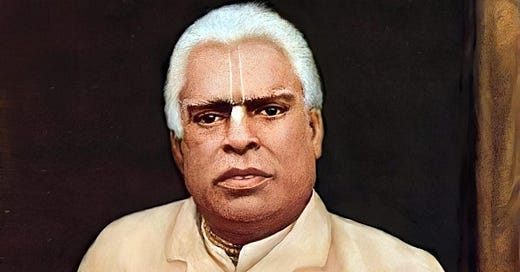Sambandha, Abhidheya and Prayojana
Srila Bhaktivinoda Thākura explains that the spiritual path is composed of three components: Sambandha, Abhidheya and Prayojana. Without proper Sambandha, we may not be able to reach the goal.
Srila Bhaktivinoda Thākura explains that the spiritual path is composed of three components: Sambandha, Abhidheya and Prayojana.
Sambandha means the philosophical knowledge about who we are, who Krsna is, what is our relationship with Him and so on. A simple way to define it is that Sambandha means theoretical understanding about spiritual life, the spiritual process and the goal we hope to achieve.
Abhidheya means the spiritual practice. There are different types of spiritual practice that lead to different results, and unlimited ways to do things in improper ways, thus one has to understand what he is doing.
Finally, Prayojana means the ultimate goal, to reestablish our eternal relationship with Krsna.
In other words, Sambandha means spiritual knowledge, Abhidheya means Sādhana or spiritual practice and Prayojana means the ultimate goal we aim to achieve.
We tend to think that love for Krsna is achieved through spiritual practice, but this is actually only part of the process. The first problem is that there are many types of spiritual practice, and these difference practices lead to different results, therefore one needs knowledge to understand which practice he should perform at each stage of his life. What is medicine for one may be poison to another. A young man may be recommended to enter married life because this may be the best for him at this stage, but the same married life would be disastrous for a renounced sannyāsī. Similarly, processes that may be beneficial for certain people at certain times (like aṣṭāṅga-yoga) will not be very beneficial in other situations.
Another point is that sādhana means much more than just performing certain rituals at certain times. A fundamental component of spiritual practice is the consciousness of the practitioner, and the right consciousness can be maintained only when one has a solid understanding of what he or she is doing, and for what.
Just like there are many different types of spiritual practice, there are also many different spiritual goals. Should one go to the celestial planets? To Brahmaloka? To the impersonal Brahman? Some say that the origin of the soul is the kāraṇa-samudra, the causal ocean, so maybe we should go back there. If one thinks he has no intrinsical relationship with Krsna and that his eternal relationship with Him has to be established, he may be inclined to the sahajiyā process of siddha-pranali, and so on.
Again, if one doesn't have the proper knowledge, he will not be able to ascertain what is the proper goal, and this will also lead him to choose the wrong practice or to practice it with the wrong consciousness.
In India, in the region of Orissa there is a class of pseudo-vaishnavas called ativadis. Members of this group worship Lord Jagannātha, while at the same time cultivating the understanding that the result of this worship will be to merge into the Lord and become one with Him. This is one example of spiritual practice done with the wrong mentality and the wrong goal.
Another example closer to us, is that nowadays is relatively common for devotees to organize programs in their homes and serve "prasāda" that they buy in the supermarket, or food cooked by non-devotees. This comes from a lack of understanding of what prasāda is. From this we can see how lack of proper understanding can destroy the very basis of our spiritual practice. Without proper understanding, one may entertain himself with different rhythms and melodies and call it "kīrtana", eat some food from the store and call it "prasāda", have some superficial relationship with some sadhu and call him "guru" and so on. In this platform one may practice for his entire life without much tangible result.
From this we can see that both Abhidheya and Prayojana are dependent on Sambandha. Just as one can't build a house without the proper foundation, without the proper philosophical understanding it's very difficult for one to properly follow the right spiritual process and much less to reach the ultimate goal.
We can see that all our main ācāryas emphasized this point and to help us achieving this proper understanding they wrote so many books. Without seriously understanding this spiritual knowledge, one will surely commit serious mistakes in his or her spiritual life and will probably not the able to reach the ultimate goal in this life.
The books from Srila Prabhupada are especially important because they are book written in a language that is very close to us, and thus can be understood easily. One may not like the candid way Srila Prabhupada explain things, or he may not agree, but is very difficult to misunderstand. The ideas he transmit are very clear. After one thoroughly studies the books from Srila Prabhupada and get a solid understanding of the basic Vaishnava philosophy, he may venture into the books of previous ācāryas, and he may also be able to understand them, but one who wants to jump straight into the writings of Srila Bhaktivinoda Thākura or the Six Goswamis may become seriously confused, since these books are further away from our present language and culture and can thus be very easily misunderstood, leading back to the original problem.





Thank you Prabhu. 🙏
Given the importance of proper philosophical understanding, can you please explain how to understand the apparent "evolution" of Vaishnava philosophy from Ramanuja, Madhva Acharya, to Lord Chaitanya in this context.
What is the outcome of sincere devotees who follow variant philosophical understandings for example those from accepted Sampradaya's who don't view Lord Chaitanya as Visnu Tatva?
In the case of associating with Vaishnavas of different philosophical understandings, is Kirtan & bhajan more important? 🙏